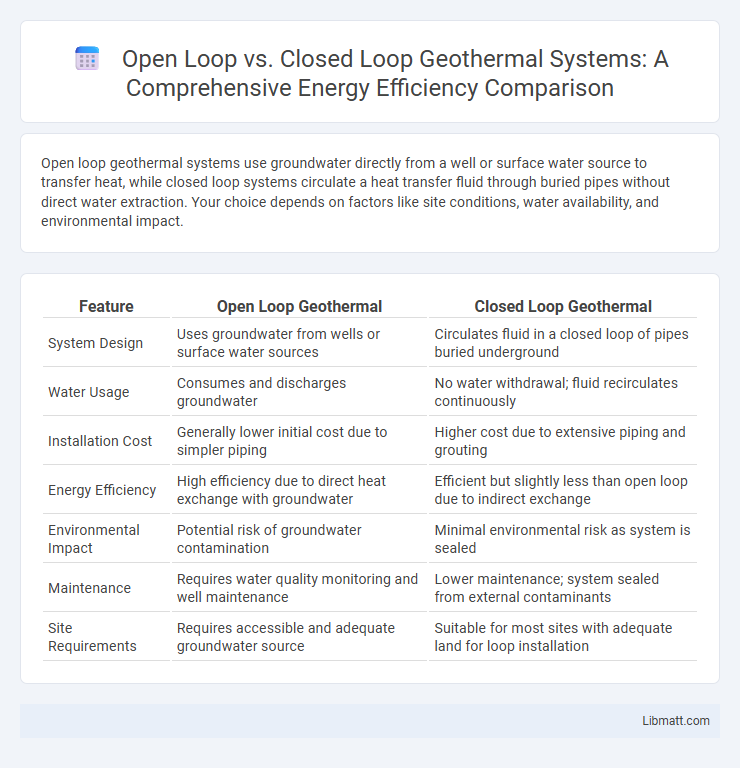Open loop geothermal systems use groundwater directly from a well or surface water source to transfer heat, while closed loop systems circulate a heat transfer fluid through buried pipes without direct water extraction. Your choice depends on factors like site conditions, water availability, and environmental impact.
Table of Comparison
| Feature | Open Loop Geothermal | Closed Loop Geothermal |
|---|---|---|
| System Design | Uses groundwater from wells or surface water sources | Circulates fluid in a closed loop of pipes buried underground |
| Water Usage | Consumes and discharges groundwater | No water withdrawal; fluid recirculates continuously |
| Installation Cost | Generally lower initial cost due to simpler piping | Higher cost due to extensive piping and grouting |
| Energy Efficiency | High efficiency due to direct heat exchange with groundwater | Efficient but slightly less than open loop due to indirect exchange |
| Environmental Impact | Potential risk of groundwater contamination | Minimal environmental risk as system is sealed |
| Maintenance | Requires water quality monitoring and well maintenance | Lower maintenance; system sealed from external contaminants |
| Site Requirements | Requires accessible and adequate groundwater source | Suitable for most sites with adequate land for loop installation |
Introduction to Geothermal Systems
Open loop geothermal systems use groundwater from wells or surface water sources to directly transfer heat, while closed loop systems circulate a heat transfer fluid through buried pipes without exchanging water. Your choice depends on site conditions, water availability, and environmental regulations, as closed loop systems typically have lower maintenance and environmental impact. Understanding these fundamental differences helps optimize geothermal energy efficiency and sustainability in your heating and cooling projects.
Understanding Open Loop Geothermal Systems
Open loop geothermal systems utilize groundwater directly from wells or surface water sources, circulating it through heat exchangers to transfer thermal energy. This method provides efficient heat exchange as it leverages the consistent temperature of natural water sources but requires careful management of water quality and regulatory permits. Open loop systems contrast with closed loop setups by relying on external water flow, offering simpler installation in suitable hydrogeological conditions but potentially higher environmental impact.
How Closed Loop Geothermal Systems Work
Closed loop geothermal systems circulate a heat transfer fluid through a series of buried pipes, exchanging heat with the surrounding ground without direct water withdrawal. The closed piping system maintains consistent temperatures year-round by absorbing heat in winter and dissipating it in summer, maximizing energy efficiency. Your heating and cooling demands benefit from this reliable system that operates quietly and minimizes environmental impact.
Key Differences Between Open Loop and Closed Loop
Open loop geothermal systems circulate groundwater through a well and return it to the aquifer, enabling direct heat exchange with the water source. Closed loop systems use a continuous loop of buried pipes filled with antifreeze or water, relying on heat transfer between the fluid and surrounding soil or rock without water extraction. Key differences include environmental impact, with open loops potentially affecting groundwater quality, while closed loops offer greater control and lower risk of contamination.
Installation Requirements and Site Considerations
Open loop geothermal systems require access to a reliable groundwater source and a well or pond for water extraction, making site selection critical for sustainable operation. Closed loop systems involve installing a network of buried pipes filled with heat transfer fluid, which demands ample land area and soil compatible with trenching or drilling techniques. Your choice between systems hinges on available water resources, land size, and geological conditions influencing installation feasibility and efficiency.
Energy Efficiency and Performance Comparison
Open loop geothermal systems typically offer higher energy efficiency by directly utilizing groundwater, resulting in better heat exchange and faster temperature regulation. Closed loop systems provide consistent performance with lower risk of contamination but may have slightly reduced efficiency due to the reliance on circulating antifreeze solutions in buried pipes. Your choice depends on local groundwater availability and your preference for operational maintenance and system longevity.
Environmental Impact: Open vs Closed Loop
Open loop geothermal systems extract groundwater directly, potentially impacting local aquifers and causing thermal pollution if wastewater is not properly managed. Closed loop systems circulate a heat transfer fluid within sealed pipes, minimizing groundwater contamination and preserving subsurface ecosystems. Closed loop designs generally offer a lower environmental footprint due to reduced risk of water resource depletion and chemical leakage.
Maintenance and Longevity of Both Systems
Open loop geothermal systems require regular maintenance to prevent clogging and microbial growth, impacting system longevity if neglected. Closed loop systems typically offer longer lifespan due to sealed, corrosion-resistant pipes and minimal exposure to contaminants, reducing maintenance frequency. Your choice affects ongoing maintenance efforts, with closed loop systems providing more reliable, durable performance over time.
Cost Analysis: Initial Investment and Operating Expenses
Open loop geothermal systems typically demand lower initial investment costs due to simpler installation involving groundwater wells, but they may incur higher operating expenses related to water treatment and environmental compliance. Closed loop systems require a more substantial upfront investment due to the extensive piping and drilling needed, yet benefit from lower maintenance and operating costs as the closed fluid circuit reduces contamination risks and energy loss. Long-term cost analysis often favors closed loop systems for their reliability and reduced operational demands, despite the higher initial capital outlay.
Which Geothermal System is Best for Your Needs?
Open loop geothermal systems circulate groundwater through a heat exchanger, offering high efficiency but requiring access to a clean, abundant water source. Closed loop systems circulate a refrigerant or water-antifreeze mix through buried pipes, suitable for sites without reliable groundwater and providing consistent performance with minimal maintenance. Your choice hinges on site-specific factors like water availability, land space, and environmental regulations to ensure optimal energy savings and system longevity.
Open Loop vs Closed Loop Geothermal Infographic

 libmatt.com
libmatt.com